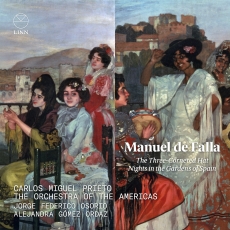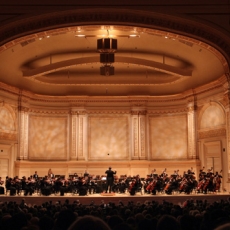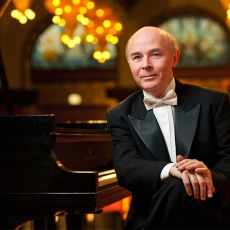The Orchestra of the Americas & Carlos Miguel Prieto - de Falla - Fanfare
It has been stated before in these hallowed pages: the hardest disc to review is one that is neither a spectacular front-runner, nor an out and out dud. In other words, one that is simply good. That is the case here. This is the second release from Linn by the Orchestra of the Americas, an ensemble based in Washington, D.C. The orchestra was founded by the present conductor and consists of musicians from both North and South America, all of whom are under 30 years of age. They are excellent musicians, solidly put through their paces by Carlos Miguel Prieto, a highly experienced Mexican conductor. The disc is well filled, containing not only Manuel de Falla’s 1919 score for Diaghilev’s Ballets Russes El sombrero de tres picos and his quasi-piano concerto Noches en los jardines de España, but two treasurable extras: the Interlude and Dance from Falla’s La vida breve, and the Intermezzo from the opera Goyescas by Enrique Granados. In my view these extra items receive the best performances here, but as I say, everything is perfectly acceptable so if you want all these works in one place you should have few qualms about purchasing or downloading this disc.
I am not aware of any poor recorded performance of Falla’s exciting and colorful ballet. Last century, among many others, we had a recording with Seiji Ozawa conducting the Boston Symphony Orchestra that remains a highlight of their discography, and even a superb version from the New York Philharmonic under Pierre Boulez. In terms of authenticity, you can also unearth the Decca recording with l’Orchestre de la Suisse Romande and Ernest Ansermet (who conducted the work’s premiere), in excellent stereo sound that stands the test of time impressively, or a 1956 mono recording from French EMI with Eduardo Toldrà conducting the French National Radio Orchestra, with soloist Consuelo Rubio. (Toldrà was an important composer as well as conductor, and knew Falla well. His performance comes in a fascinating four-disc set of historical Falla recordings, which includes Victoria de Los Angeles’s 1952 version of the complete La vida breve with Falla’s protégée Ernesto Halffter on the podium.) More recently, The Three-Cornered Hat has appeared in the Chandos Spanish series featuring the BBC Philharmonic Orchestra conducted by Juanjo Mena, coupled with a lovely performance of Nights in the Gardens of Spain with pianist Jean-Efflam Bavouzet. So competition was already fierce, but then in 2019 along came Pablo Heras-Casado and the Mahler Chamber Orchestra on a Harmonia Mundi disc, giving a performance of the ballet so replete with dazzling color and lively musical character, and in such spectacular sound, that this new one from Prieto sounds mundane by comparison. To give one tiny example: After “The Miller’s Dance,” Falla wittily quotes the so-called “fate” motto from Beethoven’s Fifth Symphony. Heras-Casado sweeps it aside as a quip; Prieto underlines it, his heavy-handedness turning the quip into a “dad joke.” With his tightly accented rhythms, you can imagine dancers responding with glee to Heras-Casado’s performance (equally so to Toldra’s), whereas Prieto, while never sloppy rhythmically, remains earthbound. In terms of sound quality, Linn has a high reputation but in this case I found the sound slightly dry, and boxy in tuttis; I felt the same about the orchestra’s previous issue of Copland’s Third Symphony and Chavez’s Sinfonia India.
I won’t go into extensive comparisons with Nights in the Gardens of Spain, which fares better here than the ballet. This is in no small part due to the muscular pianism of Osorio, who brings more substance to the work than it sometimes receives. (It is pretty music already; it does not need to be further prettified.) Nevertheless, competition is again formidable: Need I say more than Alicia de Larrocha? So I stand by my conclusion. This is not a bad release. It is well played but likely to disappear beneath a welter of previous, truly powerful performances. I applaud the initiative and raison d’être of this young orchestra, but can’t help thinking their releases would be more significant if at least some of the repertoire was more rare. There is so much great music from Latin and Northern America, why not stray a little from the well-worn paths? Did we need another Sinfonia India? No, but we could certainly do with a new recording of Chavez’s Third Symphony. As for Spain, perhaps Prieto and his band should look to Toldrà, or to the attractive Neoclassical music of Ernesto and Rodolfo Halffter. After all, the latter left Spain to settle in Mexico.



